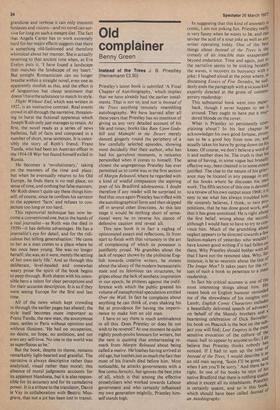Old complainer
Benny Green
Instead of the Trees J. B. Priestley (Heinemann £3.50) Priestley's latest book is subtitled 'A Final Chapter of Autobiography, which implies that we have already had the earlier instalments. That is not so, and nor is Instead of the Trees anything remotely resembling autobiography. We have learned after all these years that Priestley has no intention of giving us any very detailed account of his life and times; books like Rain Upon Godshill and Midnight in the Desert merely danced gingerly round the periphery of a few carefully selected episodes, showing most decidedly that their author, who has had his garrulous moments, is reticence personified when it comes to himself. The closest the ungregarious Priestley has ever permitted us to come was in the first section of Margin Released, where he regarded with a kind of wistful compassion the aspiring poet of his Bradford adolescence. I doubt therefore if any reader will be surprised to find that once again Priestley has trifled with the autobiographical form and then skipped off in several other directions. At this late stage it would be nothing short of sensational were he to reverse his stance of defensive caution and reveal all.
This new book is in fact a ragbag of opinionated essays and reflections, lit from start to finish with that virtuosity in the art of complaining of which its possessor is justifiably proud. He grumbles about the lack of respect shown by the philistine English towards creative writers, he moans about the idiocy of the modern bureaucratic state and its felonious tax structures, he gripes about the lack of aesthetic inspiration in our epoch, he protests against the indifference with which the public greeted his volume of metaphysical speculation entitled Over the Wall. In fact he complains about anything he can think of, even shaking his fist at providence for having the impertinence to make him an old man.
I have to say there is much ambivalence in all this. Does Priestley or does he not wish to be revered? At one moment he quite rightly pooh-poohs honours for writers, but the next is quoting that embarrassing remark from Margin Released about being called a maitre. He loathes having arrived at old age, but loathesjust as much the fact that most of his friends died before him. Most noticeable, he attacks governments with a fine comic ferocity, but ignores the best joke of all, which is that among the effective proselytisers who worked towards Labour government and who certainly influenced my own generation mightily, Priestley himself stands high. In suggesting that this kind of anomaly is comic, I am not poking fun. Priestley realiY is very funny when he wants to be, and can savour the acid of a sour joke as well as anY writer operating today. One of the best things about Instead of the Trees is the comedy of an irascible man exasperated beyond endurance. Time and again, just as the narrative seems to be sinking beneath the waves, it recovers its buoyancy with a joke; I laughed aloud at the point where, in discussing Essays of Five Decades, he suddenly ends the paragraph with a vicious kick expertly directed at the groin of contemporary readership: This substantial book went into paperback, though I never happen to see it around. They ought to have put a min' dered blonde on the cover.
What is Priestley so persistently .coni plaining about ? In his last chapter he acknowledges his own good fortune, prorriises to be a good boy from now on, and acually takes his leave by going down on his knees. Of course, we don't believe a word of it and neither does he. The truth is that his sense of having, in some vague but brutaltY effective way, been cheated is to some extent justified. The clue to the nature of his grievance may be located in any passage in anY of his books where he discusses his ow°, work. The fifth section of this one is devote° to a review of his own output since 1968; it iS easy to see what has always troubled him. He sincerely believes, I think, in two Propoitions, that he has done good work, and that it has gone unnoticed. He is right about the first belief, wrong about the second, although I would hate to have to try to convince him. Much of the grumbling about neglect appears to be directed towards a few fashion-makers of yesterday who"wouldn't have known good writing if it had fallen on them. Why Priestley should bother with all that I have not the remotest idea. Why, f01:. instance, is he so neurotic about the fate ol The Image Men? It takes years for the virtues of such a book to penetrate to a mass readership. In fact his critical acumen is one of the most interesting things about him. /4i,s recent book on English humour remindeu me of the shrewdness of his insights int° Lamb; English Comic Characters includes a beautifully delivered speech of advocacY on behalf of the Shandy brothers and 3 heartening celebration of Dick Swiveller; his book on Peacock is the best on the subject you will find; Lost Empires is the Most sensitive evocation of the culture of the music hall to appear by anyone so far; believe that Priestley thinks nobodY of noticed. If I had to sum up the tone Instead of the Trees, I would describe it as, an old man saying, 'Soon be gone, an i`" when I am you'll be sorry.' And there he ,s 1s right. In one of his books he says of 11.t native Bradford that there is nothing cluallti about it except all its inhabitants. priestlekY is certainly quaint, and so is this boo wnhAicuhtosbhiooguriy should been called Instea a d Of


































 Previous page
Previous page